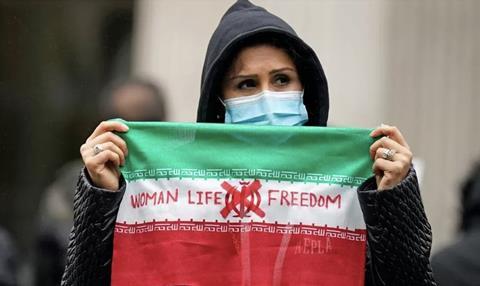Veronica Zundel looks at the mistreatment of women round the world, and ponders the origins of such abuse

In September we saw the anniversary of the death of Mahsa Amini, the young Iranian woman beaten to death by the ‘morality police’ for not wearing her hijab correctly. In the wake of her death, demonstrations broke out all over Iran, with women burning their hijabs or refusing to wear them. The demonstrations died down in the wake of extreme police brutality, but 25–30 per cent of Iranian women are still going out without headscarves, at the risk of arrest or even death.
On the anniversary of Mahsa Amini’s death, the BBC interviewed a young mother who had been on one of the demonstrations and been shot by police, losing an eye. She now lives in Italy, having had to leave her pre-school twins behind with their grandparents. Yet she says she does not regret the action she took on behalf of all of Iran’s women.
I remember when the war was raging in Afghanistan the journalist Polly Toynbee filed a report from there describing how occasionally she saw “something horrendous” flit across the street: a figure swathed head to toe in black, which was all that could be seen of a woman. She concluded that to the Islamist Taliban, a woman was a source of such fear and dangerous power that she had to be hidden from view, her power controlled.
Where does the need to control come from?
Do men hate women? Or do they just fear us greatly? Anthropologists have suggested that to primitive man, women had magic powers to bring forth new human beings, which they did not at first connect with sex. I’m not sure how likely this theory is, but I’m pretty sure that in societies where monogamy may not have been well established, a man would want to maintain control over ‘his’ woman to make sure her offspring were all his. Is that the source of ‘the patriarchy’? Or is there something deeper – the dependency small boys feel upon their mothers, conflicting with their urge to become independent and identify as males? (The situation is more complicated with mothers and daughters, where the daughter has to negotiate her independence while at the same time become a woman by modelling herself on her mother.)
We may never know its origin, but of this we can be clear: mistreatment of women, even femicide, is distributed over the whole world and if we read how Adam blames Eve in Genesis 3, we might even claim misogyny as the original sin. Certainly it is the primal example of discrimination against someone else because they are different from you. And yet, in Genesis 2:23, it is the likeness and equivalence of woman to man that is stressed, in contrast to the difference between the man and the animals: “The man said, ‘This is now bone of my bones and flesh of my flesh; she shall be called ‘woman’, for she was taken out of man.’”
Perhaps we should not be surprised that this relationship of equals soon turned hostile: it is always our nearest neighbour who is our readiest enemy: see the history of Catholics and Protestants in Northern Ireland, for example.
Unpacking language use
On a quite different but related tack, I was at a theology forum last week. Three academic papers were given by men and two by women, which seemed roughly balanced given that five is an odd number. But then I noticed something. First a male speaker referred to female ordinands in the Church of England as “girls”. Since when have the Anglicans been ordaining under-age priests? Then a Baptist speaker mentioned “a lady superintendent” he had known. And finally, and most insultingly, another male participant classed a woman bishop in his diocese as “a female”, as though she were some sort of farmyard animal.
What is so unspeakable, so taboo, about the word ‘woman’? We rarely refer to men as ‘gentlemen’ these days, except in the context of an after-dinner speech. Why are we so reluctant to use the word ‘woman’? Are we still in the Victorian age, where ‘woman’ in practice meant a woman of loose morals or a prostitute? Sisters, I believe this linguistic quirk is actually where the persecution starts. As a writer, and as you may have gathered as my readers, language matters to me a lot. When I have heard people reject gender-neutral language with the dismissal “It’s only words” I have often been tempted to swear at them and then repeat “It’s only words” (I never did). If language practice makes people think of ‘woman’ as a term of abuse, how many more steps before they think it is acceptable to abuse women?
Veronica Zundel is an author and regular contributor to Bible Reading Fellowship’s New Daylight.

































2 Readers' comments